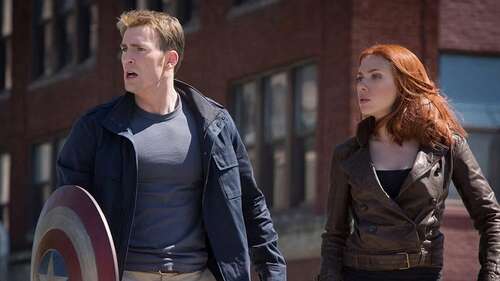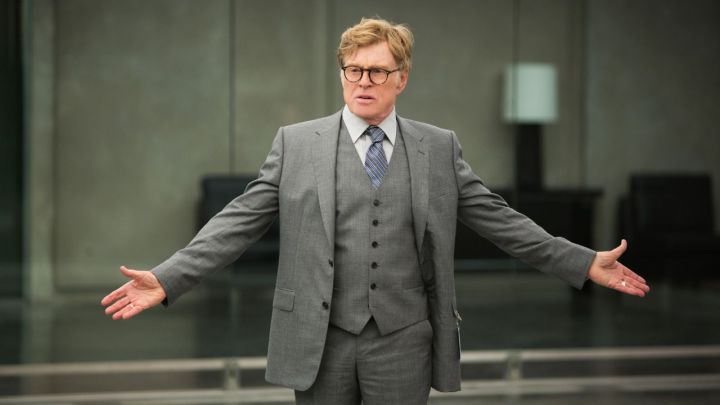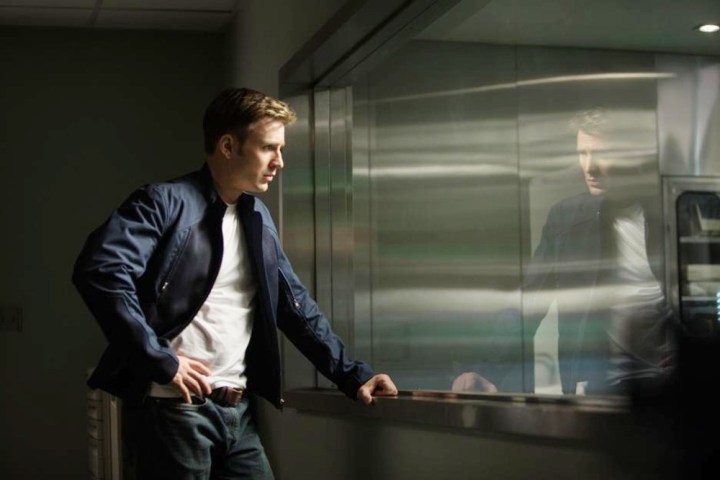
“A political thriller of the ’70s” is how Kevin Feige, the man in charge of the Marvel Cinematic Universe, described the new Captain America movie his studio was releasing in the spring of 2014. At the time, it seemed like an awfully highfalutin point of reference for a film about a defrosted patriotic superhero who chucks his shield at bad guys. Hadn’t James Mangold tried the same tack a year prior, dubiously citing Ozu as a major influence on his Marvel adaptation The Wolverine? Couldn’t these guys just admit they were making capeshit?
As it turned out, there was some validity to Feige’s boasts. Captain America: The Winter Soldier, which hit theaters 10 years ago this month, was first and foremost another Marvel movie — zippy and quippy, with a splashy CGI climax, superheroes who trade wisecracks as often as blows, and cameo appearances in the credits. But it was sort of a political thriller, too … and a fish-out-of-water comedy, and an action vehicle, and a drama about a returning soldier, and a nutty science-fiction curiosity of the They Saved Hitler’s Brain variety. It was all of those things at once, even as it comfortably fit the mold of what was fast becoming the most popular Hollywood franchise ever.
The previous starring vehicle for the character, Captain America: The First Avenger, had its own singular genre flavor: a rah-rah throwback vibe as it tackled the WWII origin story of supersoldier Steve Rogers (Chris Evans) through the visual language of wartime propaganda. The fleet-footed sequel adopts a new stylistic vocabulary, in accordance with Cap’s move out of his original historical context. He’s become an anachronism, nostalgia for all-American heroism personified. The script, by Christopher Markus and Stephen McFeely, foregrounds that tension, leaping off from the matter of how a Greatest Generation icon — molded in a nation’s rose-colored self-image — would grapple with his role in an America that’s lost its flattering illusion of innocence.
Unwavering nobility is not, on paper, the most interesting trait. (It’s why Superman, a crosstown kindred spirit, is a tricky role for any actor looking to do more than mythically pose.) But in The Winter Soldier, Evans makes Cap so square, in his outdated everything, that he’s almost hip — or at least sympathetic. He finds the humor and loneliness in Steve Rogers, an underdog despite his flawless physique and ironically Aryan good looks. So much of the movie rests on the understatement of his performance. So much of the franchise, too. One of the many problems facing the MCU post-Endgame is the lack of any heroes as appealing as Captain America, a gee-whiz relic who’s likably out of his element.
The movie’s directors, Joe and Anthony Russo, were a little out of their element, too. Before The Winter Soldier, they worked mostly in comedy, alternating Hollywood movies like You, Me and Dupree with steady gigs on hip network sitcoms like Arrested Development and Community. But that experience gave them the sensibility Feige was chasing — a jocular humanity that aligned with the tone Joss Whedon had brought to the series with his tag-team smash The Avengers. In a sense, The Winter Soldier simply scaled up the energetic genre pastiche of their most ambitious TV episodes — Community was basically their undergraduate audition for action-comedy duty.
The Russos would go on to make some of the franchise’s biggest hits, including the record-breaking Avengers: Endgame. Their approach would lose its flavor some over the years, as cast lists ballooned, the spectacle got more digital, and the color palette went grayer and murkier. But it mostly works like gangbusters in The Winter Soldier. There’s a stunt-forward physicality to their action scenes — a focus on hand-to-hand combat — that’s missing from a lot of Marvel movies, before and afterwards. A late highway shootout with the eponymous villain has a certain diet-Michael Mann urgency. And the movie peaks with a great, messy close-quarters brawl in an elevator, pitting Captain America against a bunch of nervous S.H.I.E.L.D. agents.
Those years in the sitcom trenches gave the Russos a talent for managing volleying bon mots and clashing personalities. The Winter Soldier has plenty of both; it gives Cap chemistry with everyone as he builds a cavalry around him. Anthony Mackie is agreeably down to earth as Sam Wilson, an everyman veteran whose human vulnerability — his decided lack of superpowers — mirrors Steve’s own origins as a guy puny in size, but not spirit. Scarlett Johansson deepens her Black Widow a little without jettisoning the strategic aloofness that defines the character; her rapport with Evans is flirtatious, but essentially platonic, a faint echo of screwball comedies past. And this might be the single-best use of Samuel L. Jackson’s Nick Fury. Maybe it’s just fun to see a secret agent of such unflappable cucumber cool actually break a sweat for once, as he scrambles to narrowly escape death.
Some might argue that The Winter Soldier is only superficially engaging with those 1970s conspiracy thrillers Feige mentioned — movies like The Parallax View and Three Days of the Condor and All the President’s Men. All the same, there’s a resonance to the nods, including the Tarantino-worthy casting coup of securing Robert Redford to play (spoiler alert) the film’s stealth villain, a D.C. bigwig abandoning decades of anti-war policy in favor of absolute fascistic control. If the movie presents Captain America as an idealist awakening into a world more cynical than the one he remembers, Redford’s Alexander Pierce is the flip side, a man whose idealism has been slowly eroded over the years. The savviness of The Winter Soldier’s genre tribute is how it presents the eyes-open paranoia of Watergate-era thrillers as an internal conflict for Steve — the way he experiences decades of national disillusionment in something like real time.

In its breezy four-quadrant way, the movie is about the impossibility of squaring different eras of national identity. Captain America, a symbol of a country that no longer exists and maybe never did, must face the reality of what his homeland has become. It’s a theme further complicated by the film’s relationship to the U.S. military. Like several other Marvel movies, The Winter Soldier offered full script approval to the Department of Defense in exchange for access to military resources — an arrangement that’s led plenty of people to characterize the MCU as glorified recruitment material. But for all they center an idealized mascot of military might, the Captain America movies don’t fit that profile so cleanly. While The First Avenger touched upon its hero’s uneasy utility as a living Uncle Sam, The Winter Soldier questions the virtue of following orders when the whole political apparatus is corrupt and compromised.
And, of cours,e there’s a renewed relevance to the movie’s big twist: the revelation that the Nazi-funded terrorist cell HYDRA infiltrated U.S. intelligence decades earlier, “growing like a parasite within it.” Back in 2014, that felt almost safe, like the film’s way of flinching away from a critique of the U.S. government by placing the blame for its crimes on a shadow element within it. But a decade later, “Nazis have overthrown Washington” hits a little differently. And anyway, maybe that twist speaks to a larger rot within American politics — an institutional racism and fascism that predates the Third Reich, and which would require more than the flying fists of Captain America to purge from our real halls of power.

The Winter Soldier wears all this pretty lightly. After all, it’s still a comic-book movie, albeit a particularly well-oiled one — an exciting, funny, mildly affecting blast of save-the-world entertainment. Despite the genre accents, it remains faithful to the MCU formula as Feige and company defined it, down to the slightly numbing green-screen spectacle of its ending. But the film also showed how far that formula could be stretched without snapping, and demonstrated what it looked like when this blockbuster machine fires on all cylinders.
That’s probably why it remains, a decade later, close to the pinnacle of the studio’s output. There might be better movies in the franchise— one thinks of James Gunn’s idiosyncratic Guardians of the Galaxy trilogy, which comes pretty close to just doing its own thing, or of Black Panther, with its Shakespearean pathos and general lack of Avengers cross–promotion. But at this point, nothing else has felt more like the platonic ideal of the model Feige fostered, and nothing has made the juggling act the model mandates look easier. The Winter Soldier gave “Marvel movie” a good name. These days, that makes it look every bit as anomalous as its unfrozen boy scout superhero.
Captain America: The Winter Soldier is now streaming on Disney+. For more of A.A. Dowd’s writing, visit his Authory page.
Editors’ Recommendations

